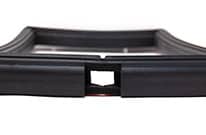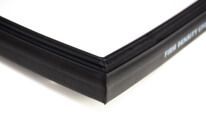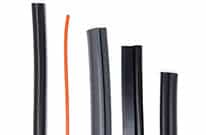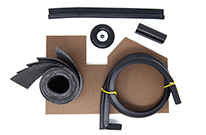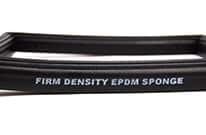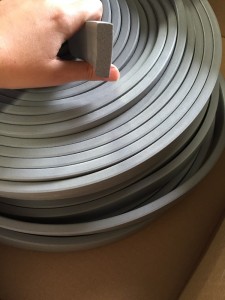
Elasto Proxy custom-fabricates silicone hatch seals for demanding applications. These specialty gaskets support superior sealing with good compression set and temperature resistance.
Gasket designers want rubber hatch seals that are as tough as the vehicles, equipment, and infrastructure that need them. If a hatch seal can’t withstand compression, it may over-compress and admit wind, water, dirt, or mud. If a hatch seal can’t withstand a wide range of temperatures and outdoor environmental conditions, seal failure can result, too. If you need hatch seals for military vehicles, mobile equipment, marine applications, or HVAC systems, there’s plenty to think about. Fortunately, help is available.
For every hatch seal design, compound selection is critical. As readers of this blog learned last March, choosing the right rubber won’t stop enemy fire, but choosing the wrong rubber can result in over-compressed hatch seals on military vehicles. That’s why although neoprene rubber offers an excellent balance of material properties, this elastomer wasn’t the best choice for the military gaskets that Elasto Proxy inspected. After examining the results of over-compression, we recommended silicone sponge rubber seals instead. Is this same elastomer right for your application, too?
What’s So Special about Silicone Sponge?
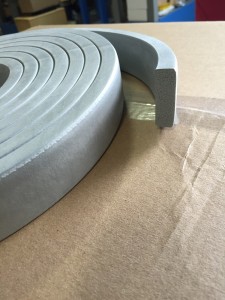
Silicone gaskets provide hatch seal designers with excellent temperature resistance and good temperature stability. A family of synthetic rubbers, silicones withstand low and high temperatures far better than natural rubber. Plus, unlike some other elastomers, silicones remain flexible at low temperatures while retaining adequate stiffness at higher temperatures. Silicone rubber’s ability to repel water and resist ozone, sunlight, weathering, and aging also make it a good choice for hatch seal designs.
All silicones aren’t the same, however. Like many other types of elastomers, silicones can be supplied as either sponge profiles or solid profiles. (Silicones are available in other forms and form factors, too.) Solid silicone gaskets in lower durometers provide excellent environmental sealing with low closure force. Sponge silicone gaskets combine excellent low-durometer sealing with cushioning and padding – key properties for applications such as military vehicles that travel off-road or on rough, bumpy roads.
For hatch seal designers, silicone’s consistent compression set over a wide range of temperatures (-60° C to +250° C) is especially valuable. With elastomers, compression set refers to a rubber’s ability to return to its original thickness after prolonged compressive stress, such as a vehicle hatch pressing against a hatch seal. Because compression set results are expressed as a percentage, elastomers with lower percentages are said to have “good compression set”.
Compression set varies with temperature and deflection, however, so hatch seal designers need to consider these variables in order to design a better hatch seal. In the case of military vehicles, rubber seals of any kind may be exposed to temperatures ranging from desert heat to artic cold. Plus, hatches are slammed shut and subjected to rugged usage conditions. Yet when military personnel exit the vehicle, hatches need to shut smoothly and securely every time.
Silicone Hatch Seals from Elasto Proxy
Elasto Proxy custom-fabricates rubber hatch seals from various types of silicone sponge. Examples include ST-375-23-SM and ST-500-32-SM. Pictures of both types of weather stripping accompany this blog entry. In the case of the military vehicle that we blogged about back in March, Elasto Proxy converted 1/8”-thick strips of silicone foam into precision-cut lengths. Water jet cutting is fast, precise, and doesn’t require expensive tooling. Plus, Elasto Proxy can tape your silicone hatch seals for peel-and-stick gaskets that speed installation on assembly lines or in the field.
Do you need hatch seals for military vehicles, mobile equipment, marine applications, or HVAC systems? Are gaskets made of silicone sponge the right choice for your application? Don’t settle for what seems like “good enough” when a better choice is available. Contact Elasto Proxy and talk to our solutions providers and learn more.






